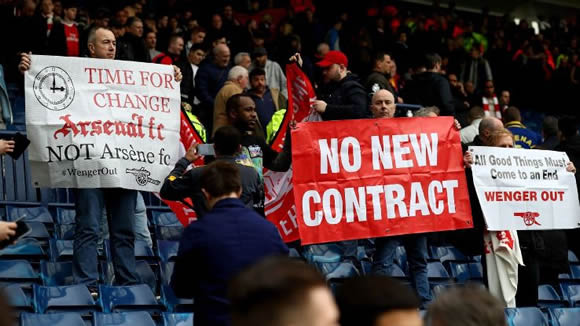Arsenal top-four failure would be a disastrous end to Arsene Wenger era
Posted Sunday, March 19, 2017 by ESPN

Arsenal are now in serious danger of finishing outside the top four, something they've always avoided under Arsene Wenger.
WEST BROMWICH, England -- Ultimately, it was Arsene Wenger himself who provided the most comprehensive summary of Arsenal's damaging 3-1 defeat to West Bromwich Albion on Saturday.
"It was a typical Premier League game now, that you see a lot, where one team has a lot of the ball and the other defends deep well, waits for counterattacks and set pieces," Wenger explained. "West Brom did that very well. We had 77 percent of possession but didn't create enough chances."
This felt hugely predictable. West Brom average the lowest share of possession in the league, and their defensive, reactive style was even more obvious than usual here. Arsenal had 77 percent of possession, but West Brom scored 75 percent of the goals.
Afterwards, it was notable that Wenger's opposite number, Tony Pulis, spoke twice about Arsenal's strategy when explaining his side's performance. "We worked very hard in training in keeping them in front of us," said the boss. "When they get in behind you, they'll cause you problems."
Therefore, West Brom sat particularly deep, and while Pulis was disappointed at the way Alexis Sanchez was left unmarked for Arsenal's equaliser, the Chile striker and Danny Welbeck never got in behind the opposition. Why? Because West Brom defended deeper than usual, adjusting their approach to nullify Arsenal's strengths.
Even West Brom's goals owed much to their reactive strategy. "They mark zonally, so you have to do it a bit different," said Pulis. "We spent a bit of time on that, we knew if we got the right quality in with the right movement, we would get chances."
Rather than multiple aerial threats circling menacingly before splitting, as usually happens, Pulis used two or three players as decoys, helping to block Arsenal's goalkeeper and drag zonal defenders out of position. There were only two real aerial targets making runs from deeper positions and one of them, Craig Dawson, headed home two goals.
It was quite a contrast -- one manager reflecting upon the opposition's performance as if to say, "that's how it goes," the other highlighting precisely how and why his team performed in such a manner in this particular game. Of course, that's partly because one manager lost and the other won, but it also demonstrates the difference between the two coaches and how they approach individual games. Pulis has upset Wenger's Arsenal far too many times over the years, albeit always when entertaining the Gunners at home, rather than going to the Emirates.
In fairness, Arsenal have become slightly less predictable over the past few years. There was one stage, when Wenger packed his midfield solely with small ball players like Denilson and Cesc Fabregas and deployed converted No. 10s like Tomas Rosicky and Samir Nasri out wide, where Arsenal literally only did play one way: with incessant ball retention. Since then, the Gunners have become slightly more reactive, slightly more direct and slightly more physical, but when their approach is contrasted with that of Pulis, it feels like they revert to the Arsenal of old: sterile domination, as Wenger used to call it.
That West Brom would play on the counterattack comes as no surprise, but Arsenal have made little attempt to make themselves less vulnerable to this form of attack, particularly with balls played into the channels. Other teams are keeping their full-backs in deeper positions, playing a back three or keeping two defensive midfielders in position when attacking.
But Arsenal still play the way teams played a few years ago, before the reversion to counterattacking obvious across the Premier League: full-backs high, one midfielder in place and lots of space in the channels. West Brom's first set-piece goal came from a corner following a classic counter, with left-centre-midfielder Chris Brunt slipping in left-winger James McClean, who blasted at Petr Cech. Later, Nacer Chadli did the same going the other way. West Brom were comfortable without possession and lightning quick at transitions.
The set-piece defending, meanwhile, was atrocious. Aaron Ramsey and Alex Oxlade-Chamberlain were deployed as blockers rather than genuine man-markers, but had little influence upon Dawson's runs from the penalty spot to the six-yard box. He breezed past them and ensured he reached the ball first. Arsenal lacked that commitment, and Granit Xhaka's inability to patrol the near-post space effectively must also be highlighted; in a positional sense, it's a simple job he performed poorly.
Wenger was keen to point out the fact Arsenal's record at defending set plays so far this campaign has actually been pretty good, and it's been rare that this has genuinely been their undoing so far this season. West Brom, whose 18 set-piece goals this season is at least five better than anyone else in the Premier League, are simply highly effective at pouncing from this manner. At a point when Wenger is being debated in terms of his long-term performance and long-term future, however, it felt like a "typical Arsenal" concession.
Before Wenger's arrival, in the mid-1990s, they used to be set-piece specialists, with Steve Bould (now assistant manager) and Tony Adams constantly combining for a classic near-post flick-on routine. Incidentally, it's worth remembering that they defended set pieces zonally under George Graham with great success. As ever, no one system is better than the other, it's simply about the effectiveness of the implementation.
Wenger says he has decided upon his future and will make his intentions clear shortly. He's being judged upon his performance over a number of years, rather than a number of games. But Arsenal are now in serious danger of finishing outside the top four -- a danger they've flirted with constantly but always avoided over Wenger's period at the club.
Failing to finish inside the top four would be a disastrous, unfitting way for Wenger to bow out at Arsenal. If Arsenal qualify again for the Champions League, however, Wenger can legitimately claim that while several of his Arsenal campaigns have been disappointing, none have been a genuine failure. If he's to finally leave the Emirates this summer, therefore, the next 11 league games will have a huge bearing upon the supporters' mood when he says goodbye.
Photos
More»Meet Jude Bellingham's stunning girlfriend Laura
Thursday April 25 2024[PICTURE SPECIAL] Man Utd 4 - 2 Sheffield United
Thursday April 25 2024[PICTURE SPECIAL] Arsenal 5-0 Chelsea
Wednesday April 24 2024




Your Say